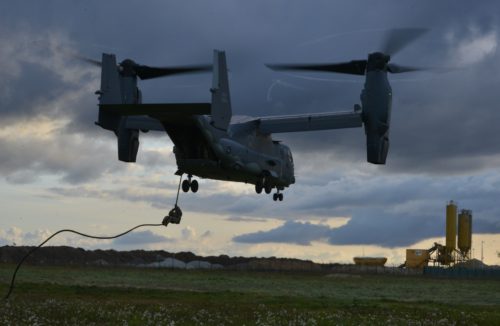The Pentagon has once again grounded its entire fleet of V-22 Osprey tiltrotor aircraft. This comes after a worrying incident at Cannon Air Force Base in New Mexico on Nov. 20, where a CV-22 Osprey experienced a near-crash shortly after takeoff. Initial investigations suggest that weakened metal components in a critical part may have been a contributing factor.

U.S. Air Force CV-22 Osprey, assigned to 352d Special Operations Wing, during Fast Rope Insertion and Extraction System training near Amari, Estonia, Sep. 3, 2019. During the week-long training, U.S. and Estonian special operation forces partnered on FRIES familiarization, casualty evacuation and rapidly loading and off-loading a tactical vehicle onto the aircraft. (U.S. Army photo by Staff Sgt. Elizabeth Pena)
The decision to pause all Osprey flights came as a recommendation from Vice Adm. Carl Chebi, the head of Naval Air Systems Command, which oversees the Osprey program for the military. This incident bears a striking resemblance to a fatal crash off the coast of Japan in November of the previous year. In that crash, eight Air Force Special Operations Command personnel lost their lives when similar weakened metal components caused the Osprey’s transmission to fail catastrophically in mid-flight.
The metal at the heart of these incidents is X-53 VIMVAR, used in critical gears within the Osprey’s complex transmission system. Microscopic weak spots within the metal, caused by the inclusion of foreign substances during manufacturing, can lead to fatigue cracking and ultimately, component failure. Following the Japan crash, investigators uncovered seven previous instances of cracking in gears, all likely attributable to this same metal weakness.
The recent near-crash at Cannon has prompted the Marine Corps, Navy, and Air Force to immediately halt all Osprey flights. The Marine Corps’ pause began on Friday and is expected to last at least until Monday. The other services are anticipating longer pauses as they conduct in-depth analyses of the metal failures. Lt. Gen. Michael Conley, commander of the Air Force Special Operations Command (AFSOC), has also ordered a pause on all Osprey training flights, allowing time for a comprehensive understanding of the situation.
This latest grounding comes on the heels of a detailed investigation published last month that highlighted growing concerns about the Osprey’s safety. The report revealed an increase in safety issues over the past five years, parts wearing out more quickly than anticipated, and inherent design flaws contributing to a number of accidents. In response, members of Congress sent a letter to Defense Secretary Lloyd Austin, urging him to ground the Osprey fleet until effective solutions to the identified safety and design issues are found and implemented.
The V-22 Osprey, with its unique ability to take off and land like a helicopter but fly like an airplane, has been plagued by accidents since its introduction three decades ago. These incidents have tragically resulted in 64 fatalities and 93 injuries. This latest pause in Osprey flights only serves to underscore the persistent anxieties surrounding the aircraft’s safety and reliability.
For more information, hit the Source below